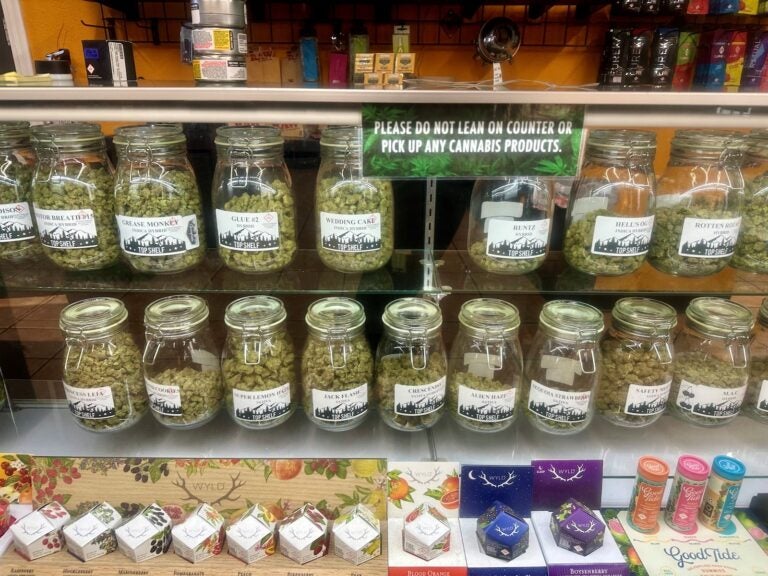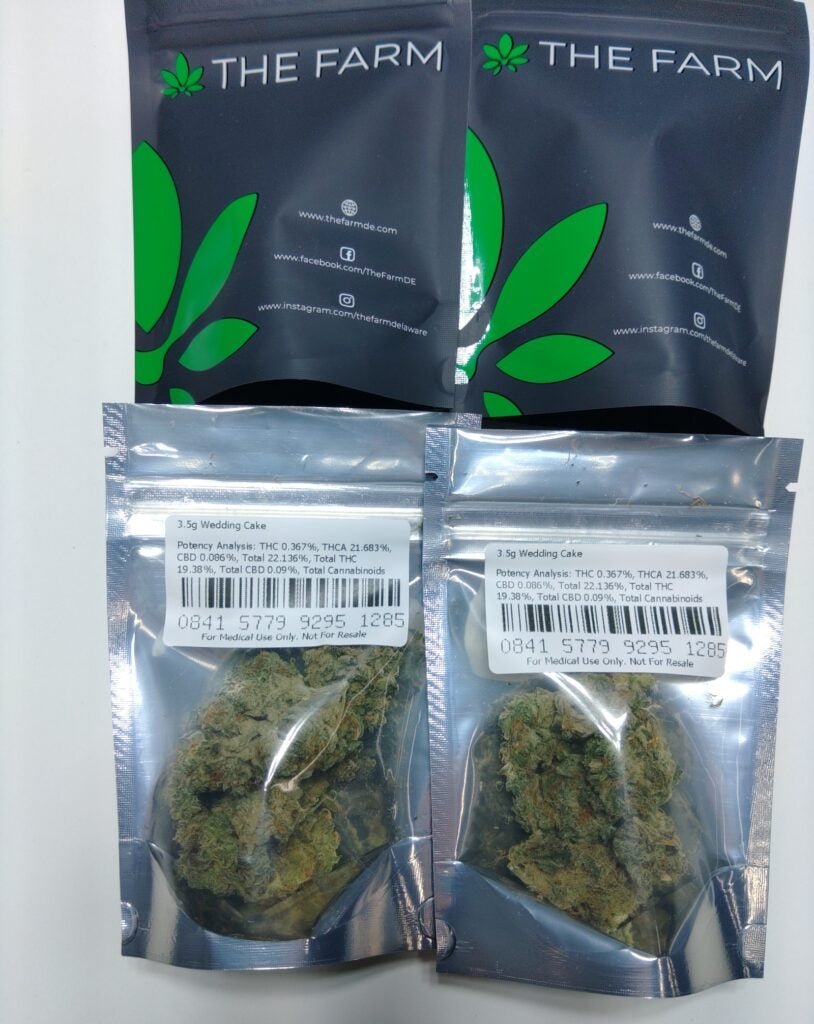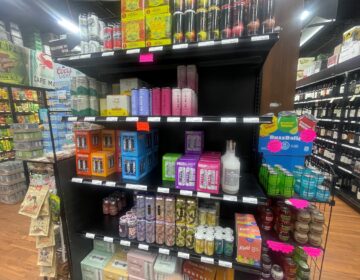Delaware weed stores will have the chance to offer ‘deli-style’ sales
The state’s proposed regulations only allow for pre-packaged buds, but the marijuana commissioner says dispensaries can seek a variance.
Listen 2:02
Marijuana sealed in mason jars is offered for sale 'deli-style' at this dispensary in Colorado. (Courtesy of Zoe Patchell)
From Philly and the Pa. suburbs to South Jersey and Delaware, what would you like WHYY News to cover? Let us know!
When buying lunch meat from the grocery store, you usually have two options: visit the deli and get your turkey sliced to your desired weight and thickness, or grab some already packaged.
That’s what advocates for marijuana users want in Delaware’s retail stores when they open in about a year — the ability to smell and inspect the buds they might be interested in buying, rather than just getting something in a labeled, resealable plastic pouch.
Zoe Patchell of the Delaware Cannabis Advocacy Network says many users prefer and deserve to have the choice of what she calls “deli-style” or “apothecary-style” shopping for weed.
“Consumers know what they’re getting, and they can see the entire product before they purchase it. So it really cuts down on the demand for returns, which is not really a common proprietary industry practice,” Patchell told WHYY News.
“No one wants to be sold a product that they didn’t get to see before they purchased it and especially not when they get that product home and find out it’s either not what they wanted or even worse, that there was something wrong with the product.”
The proposed regulations for Delaware don’t currently allow for deli-style shopping. They mirror the ones currently in place for the medical marijuana dispensaries. Leaf marijuana and products such as edibles must be in packaging that will reveal whether it’s been tampered with before purchase, and is re-sealable once it’s opened if the package contains multiple doses.
However, during a recent meeting of the Marijuana Control Act Oversight Committee, members Patchell and Adam Windett made a presentation about how they want dispensaries to display and sell bulk marijuana.
That demonstration changed the mindset of Marijuana Commissioner Robert Coupe, who told WHYY News he would soon propose offering retailers a variance from the packaging mandate as long as they can convince his office that the weed will be free of contaminants and the quality remains unaffected.
“As long as they satisfy those areas of concern, then we could issue the variance and they would be able to offer marijuana in that form as well as the prepackaged form,’’ Coupe said.

“We want to make sure that the consumer’s aware, if it’s being sold that way,’’ there could be “additional risks as far as the quality, as far as bacteria getting into that jar or getting into their marijuana, that we’re not going to be able to control like we can in the prepackaged world,’’ Coupe said. “It becomes an agreement between the consumer and that retailer that this is how I want to purchase it.“
That’s just fine with Patchell, who has shopped for weed that’s kept in sealed mason jars in states such as Oregon and Colorado, and says the practice also lets customers evaluate the product’s freshness.

‘It’s the same reason why people buy fresh vegetables over pre-canned vegetables,’’ she said. Prepackaged cannabis “typically is less fresh. The product is more dry.”
Delaware neighbors New Jersey and Maryland don’t allow deli-style sales in their recreational weed dispensaries. Pennsylvania has not legalized marijuana.
William Rohrer runs The Farm, a Delaware-based medical marijuana company with two growing operations and two dispensaries. He agreed with Coupe’s decision to offer variances and said he’d be interested in pursuing one should he get a license to sell weed to recreational users.

“It’s a good idea,’’ Rohrer said. “It really strengthens the experience when somebody goes into the store.”
Rohrer said operators will have to research the best way to ensure that bulk marijuana keeps its flavor and is free from contaminants, however.
“It just seems to be that we have a higher level of quality control when we package the products in one environment versus taking bulk product to retail and letting the patient consultants or the budtenders weigh that out and seal it up,’’ Rohrer said. “So I think it’s more about just managing the quality control of that product than resisting it.”
‘Good thing for the businesses and the consumers’
The give-and-take over packaging occurs as Delaware, one of 25 states that have legalized recreational marijuana, formulates the rules for the new industry. Those regulations, which will be offered for formal public comment, will be in place by mid-July, and the state will seek applications on Sept. 1 for 125 licenses for growers, manufacturers, testers, and retailers.
Lawmakers removed all criminal penalties last April for adults age 21 and older who possess up to one ounce of weed. Coupe said he anticipates the first retailers opening sometime next March.
His office estimates that Delaware will have 85,000 retail customers, or about 1 in 10 residents age 21 and older. Those adults are projected to spend $281 million annually on weed, generating $42 million in state revenue from the 15% sales tax.
Rep. Ed Osienski, a Newark-area Democrat who sponsored the legislation to legalize marijuana and create a regulated market, expressed his pleasure that Coupe will let dispensaries seek a variance for deli-style sales.
“I think he’s doing the right thing, letting the business folks who want to cater to this request from consumers to present a plan on how they can do that, and then he gets to have final review and sign off,’’ Osienski said. “I think it’s a good thing for the businesses and the customers.”

So does Peter Murphy, a Delaware lawyer who advises marijuana businesses about regulations and has invested in them himself.
“That seems to be a reasonable’’ approach to regulating the industry in Delaware, Murphy said. “And I think it shows how so far, the process is being handled really well. There has been a lot of back-and-forth and it’s been constructive rather than hostile or anything like that. It’s kind of refreshing to see.”

Get daily updates from WHYY News!
WHYY is your source for fact-based, in-depth journalism and information. As a nonprofit organization, we rely on financial support from readers like you. Please give today.






